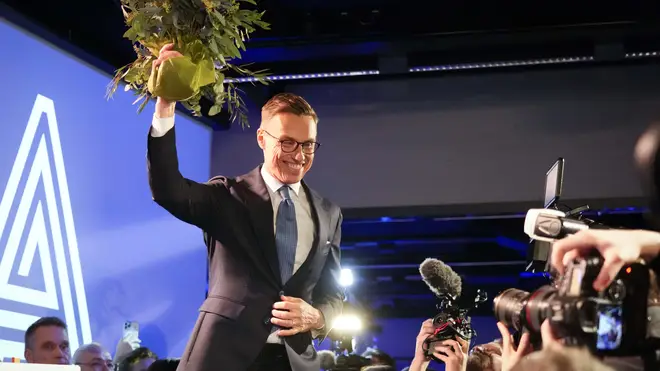
Ian Payne 4am - 7am
12 February 2024, 16:14

The country’s head of state commands the military – a key role after Finland joined Nato in April 2023 in the aftermath of Russia’s attack on Ukraine.
Former Finland Prime Minister Alexander Stubb has narrowly won a runoff vote to become the country’s next president, who will steer security policy that includes integrating the new Nato member into the alliance at a time of concern over Russia’s invasion of Ukraine.
The final tally from Sunday’s runoff shows Mr Stubb, of the centre-right National Coalition Party, had 51.6% of the votes, while independent candidate and former foreign minister Pekka Haavisto from the green left got 48.4% of the votes.
The two were the top vote-getters in the second round of the election. Mr Haavisto had served as Finland’s top diplomat in 2019-2023.

Mr Stubb is taking over from the hugely popular President Sauli Niinisto, who isn’t eligible for re-election while his second six-year term expires next month.
A runoff was required after none of the original nine candidates got a majority of the votes in the first round on January 28.
In tradition with consensus-driven Finnish politics and no below-the-belt attacks during the campaign, Mr Stubb visited Mr Haavisto’s election party event late on Sunday after the result was clear.
“You’re one of the nicest people I have ever met,” Mr Stubb told his opponent Mr Haavisto at the party event, according to Finnish broadcaster YLE.
The presidency is a key political post in this northern European country of 5.6 million people. Unlike in most European countries, the President of Finland holds executive power in formulating foreign and security policy together with the government.
But they are also expected to remain above the fray of day-to-day politics and stay out of domestic political disputes while acting as a moral leader of the nation.
The head of state also commands the military — a key role after Finland joined Nato in April 2023 in the aftermath of Russia’s attack on Ukraine a year earlier.
Finnish media outlets pointed out on Monday how Europe’s security is at stake as never before since the Second World War, due to Russia’s invasion.
At a news conference in Helsinki, Mr Stubb was asked by The Associated Press to assess the state of the Finnish military and whether he intended to be a hands-on commander.
“We have one of the strongest military forces in Europe,” Mr Stubb replied.
He pointed to Finland´s wartime military strength of 280,000 through reservists – a number that is augmented by some 900,000 men and women who have received military training through conscription service.
“When the Cold War ended, Finland did not run down its military – quite the contrary,” Mr Stubb said, referring to the modern state of the country´s defence forces.

“We will play our part in the alliance (Nato). People trust us and they know that we are serious about our defence for rather obvious reasons. Will I be an active commander-in-chief? Yes, I intend to do that,” he said.
Doubts also linger in Finland as elsewhere in Europe over the United States’ future commitment to Nato — doubts that former US President Donald Trump appeared to rekindle over the weekend as the front-runner for the Republican nomination ramped up his attacks on foreign aid and long-standing international alliances.
“Mr Stubb will become a president of difficult times, possibly even a wartime president,” Finnish newspaper Ilta-Sanomat said in an editorial.
Mr Stubb, 55, was prime minister in 2014-2015 and started his political career as a lawmaker at the European Parliament in 2004. He will become the 13th president of Finland since its independence from the Russian empire in 1917.
Ukrainian President Volodymyr Zelensky was among the first foreign dignitaries to send “sincere congratulations” to Mr Stubb. The war in Ukraine has deeply affected the citizens of Finland, which shares a 1,340-kilometre (832-mile) border with Russia.